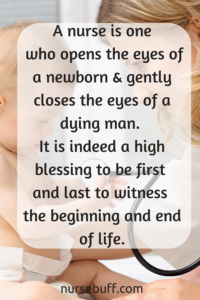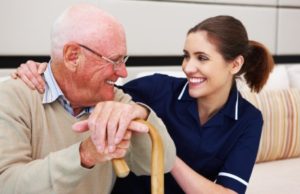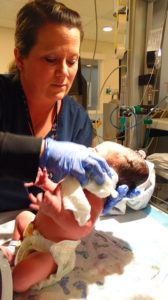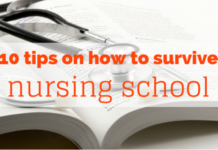A nursing school builds the foundation of what nurses know about patient care, however, there are important things you don’t learn from books or teachers. Here’s a list of the things you will never learn in a nursing school.
1. How it feels to touch people’s lives
Nursing is an amazing profession. Nurses have the opportunity to witness the beginning and end of life, from birth to death. They have the chance to uplift people’s spirit in the most difficult point of their lives. Do you know how it feels to see one of your patients walking down the street fully recovered from his disease? And how a simple but sincere gratitude from your patients can give you more energy at work?
Also Read: 50 Nursing Quotes to Inspire and Brighten Your Day
2. Time-management skills
In nursing schools, everything you encountered during your clinical duties is based on the most ideal standards of nursing care. In reality, once you start working as a registered nurse, you will learn that your workload doesn’t always comply with the recommended standards of nursing practice. For example, you will encounter shifts where the subscribed nurse-patient ratio isn’t followed. Worse, you will need to work overtime due to insufficient nursing staffing.
During these times, your best time-management skills will come out naturally. Nursing schools will never teach you how to multitask but this is a skill you will develop while on duty.
3. Dealing with doctors
Doctors have different personalities. Some are cooperative while others will test your patience. No matter how rude a particular doctor is, don’t let your confidence be affected. Stand firm on your decisions and actions.
When a doctor is rude to you, don’t take it personally. Be professional and remember that patient care is always your topmost priority. You need to develop a strategy in communicating with uncooperative doctors and you can only learn this through experience.
Also Read: 5 Nursing Tips On How To Deal With Difficult Doctors
4. Listening to nursing assistants
Nursing assistants who have been practicing for decades can teach you valuable lessons about patient care. While you may have spent more time in nursing school than them, they know lots of things that cannot be learned through books.
Experience is the best teacher but you can also learn a lot from the experience of others. Some nurses have their own share of stories where a nursing assistant saved their license with just a simple tip. Consider what your nursing assistant has to say when you are having difficulty in managing the care of your patient.
5. Giving a good report
In nursing schools, nursing students are trained on giving and taking a report. However, nursing schools only teach the basics of a report. It is only in real life practice where you will learn how to give a good endorsement report and how to see holes in a poorly constructed one.
As you gain more experience, you will eventually learn the important points to consider. When you encounter problems from a poor report, you learn what to avoid and how to make your own report better so the incoming nurse will not encounter similar problems.
6. Anticipating patient treatment care
In time, you will be so familiar with patient care that you can predict the next step for the patient’s treatment regimen. There are times where doctors are impressed to see that their nurse already prepared a catheter insertion set when they are just about to order for one. Treatment management for certain cases is not hard to keep in mind especially if you handle the same case frequently.
7. Wise assessments
Nursing schools taught students how to do a complete physical assessment. In real-life practice, nurses can do more kinds of assessments to a patient. Nurses use their “wise” assessments in planning how they will provide nursing care to the patient.
What are these wise assessments?
Within minutes, nurses can tell if a patient is lying or not with their health complains. They can sense which relative can be a problem to the planned nursing care of the patient. They can also predict how all unrelated symptoms can lead to one serious condition. Techniques in patient assessment cannot be learned instantly as it takes years to develop this skill.
8. Nursing life hacks
A life hack is a trick or a shortcut that makes tasks easier to accomplish. Life hacks in nursing practice are helpful in making everyday work of nurses lighter and less tiring. Most nursing life hacks are discovered accidentally when nurses use their creativity and resourcefulness in keeping up with tasks at work.
Because a life hack is a trick, it is one of the things they don’t teach in nursing school. Clinical instructors are teaching traditional nursing care practices and not the “shortcut” ones. You can only learn life hacks from your senior nurses and through your own personal experiences at work.
Also Read: 25 Life Hacks Every Nurse Should Know
9. How important teamwork and camaraderie are
Does your nursing school give you an idea how important teamwork and camaraderie are in easing down burden at work? Once you help other nurses in your unit, you will also get a helping hand when you need one with your patients. A busy shift in a unit is less tiring when nurses are helping each other in their tasks.
10. How to nourish yourself in-between tasks
Nursing schools doesn’t teach you how difficult it is to manage mundane things like eating or peeing while on duty. It is only through real-life practice where you can learn to eat within two to five minutes and still use the bathroom no matter how busy you are with your patients. You will also learn to eat snacks and drink water while doing other nursing tasks at the same time.
Some nurses do not do well in balancing the care of their patients along with how they care for themselves. They prioritize the needs of their patients over their own nutrition or bathroom breaks. Sadly, this sometimes leads to burnout. To be sustainable, nurses should put their needs first so they can have more energy in taking care of their patients.
11. How brittle life is
Nurses witness birth and death almost every day. As they see how life can be lost in a matter of seconds, they give life the highest priority it deserves. In hospitals, not everyone is given the second chance to live and nurses know how important it is. Because nursing schools don’t teach this, it is only in real-life practice where you learn the real value of a life.
12. Lessons from your patients
You will have many patients and there are ones that will leave a mark in your life.
Some chatty patients share their greatest insights about life. They share amazing stories and sometimes, they are even funny. There are also some patients that will not talk that much but you can still learn a lot from their health history and case. You can realize that if you have the same lifestyle as theirs, you could end up like them in the future. You learn from their experiences and this is an important thing you cannot learn through books.
Nursing schools teach facts and procedures but only experience can show you what real nursing is all about. So while in nursing school, absorb everything your teachers and your books have to offer. Then, when you start real life practice, you’ll finally get to experience all the things they didn’t teach in nursing school.
About the Author: Je Abarra is a nurse by profession and a freelance writer by passion. She is working as a staff nurse in the pediatric ward of a private city hospital for more than two years. During her free time, she usually writes about her fascinations in health and nursing. She loves to provide tips and fun facts about nursing and healthy living.































